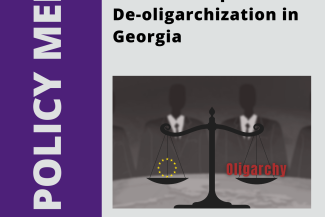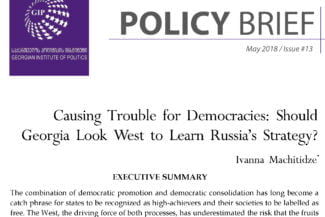On February 1st of 2023, GIP presented the second Georgia Governance Index (GGI) – an exhaustive progress report in the four spheres of Georgian governance measured in the previous year: democracy and human rights (democratic governance), effective state and state institutions (effective governance) social and economic policies (socio-economic governance) and foreign and security policy (external governance). The index was presented in Tbilisi to inform the Georgian public and international community about the challenges of governance and democratization in Georgia. The presentation included key findings, expert survey results, and was followed by an open discussion in Q&A format.
The GGI is meant to increase accountability and transparency in governance and provide a platform for civil society to voice their concerns and provide constructive policy suggestions. The GGI continues to be a valuable tool for decision-makers in Georgia as it provides a comprehensive and uniquely Georgian perspective on the country’s governance and democratization processes. It highlights areas of improvement, as well as areas where more work needs to be done, allowing for informed decision-making to address the challenges faced by the country.
Key Findings:
- Democratic governance scored the lowest in the GGI survey, with ongoing political crisis, polarization, radicalization, and failure of judicial reform being major challenges. Judicial reform is still the biggest issue for 2023, with polarization, single-party rule, and controversial amendments to the Criminal Procedure Code also affecting possible candidate status. On a positive note, legislative changes for the election of the prosecutor general and new electoral legislation were made, including the introduction of electronic voting in 2024.
- Effective governance received a low score, with informal governance, corruption, and lack of control over occupied territories being the main challenges. The fight against informal governance received the lowest score, and oligarchic governance remains a hindrance to EU candidate status. Public services perform well, but gaps remain in judicial reform, anti-corruption, and combating informal governance and oligarchy.
- Economic and social governance received the highest score in the GGI survey. Despite this, problems such as rising inequality, social impacts of increased migration from Russia, and increasing prices on pharmaceuticals persist. The strong economic recovery was accompanied by high inflation and tight monetary policy, potentially affecting growth and inclusiveness. The introduction of the DRG system was a positive step.
- External governance also decreased significantly, facing challenges in dealing with the impact of the Russia-Ukraine war and changing geopolitical landscape in Europe. Georgia played a role in mediating the Azerbaijan-Armenia conflict and increased its importance in energy and transit, but confrontational relations with Ukraine and the West, and a suboptimal response to Russia-related security risks remain challenges.
The full GGI document contains detailed key findings, results, and recommendations, providing a roadmap for future progress in governance and democratization in Georgia. More information, including detailed results and recommendations, can be found in the full GGI document.
Photo gallery 👇







